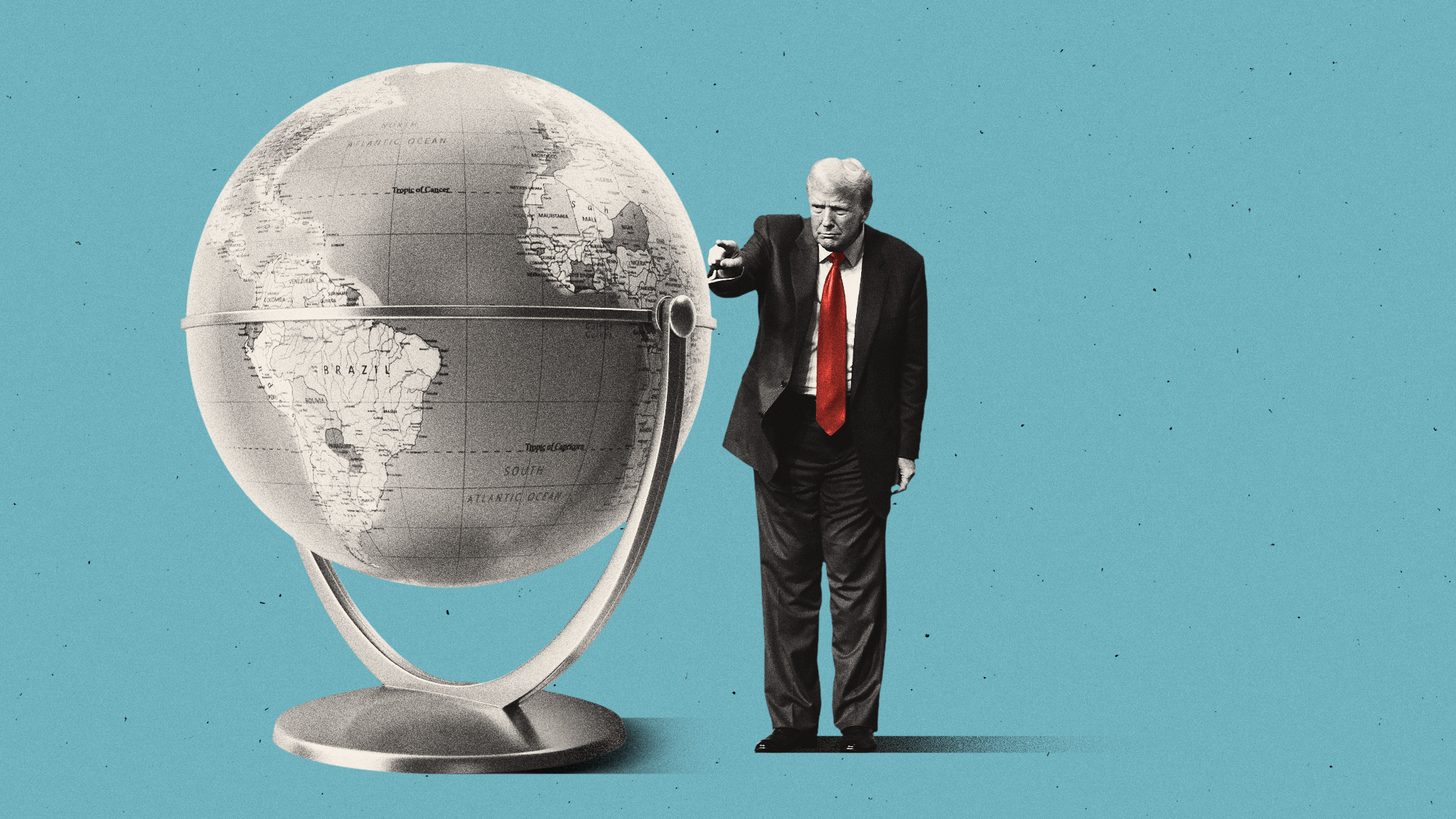Vladimir Putin’s ‘nuclear tsunami’ missile
Russian president has boasted that there is no way to intercept the new weapon

A free daily email with the biggest news stories of the day – and the best features from TheWeek.com
You are now subscribed
Your newsletter sign-up was successful
Vladimir Putin has said that Russia has successfully tested an (unarmed) underwater nuclear-torpedo powerful enough to “put entire states out of operation”. Speaking at an event for veterans of the Ukraine war last week, the Russian president said “there is nothing like” the Poseidon missile.
What is the weapon?
Russia’s new nuclear submarine, Khabarovsk, is armed with autonomous Poseidon missiles. Said to be 20 metres long and nearly two metres wide, they are capable of travelling up to 6,200 miles at speeds of up to 115 mph, deep below the surface of the water. According to arms control experts, the weapon breaks “most of the traditional nuclear deterrence and classification rules”, said The Guardian. “Launched from a submarine like a torpedo”, it is thought that they are “able to loiter as an underwater drone” before deploying a nuclear warhead “capable of triggering a radioactive tsunami to render coastal cities uninhabitable”.
“Compared to an intercontinental ballistic missile it is very slow”, said Naval News, but still fast enough to be “realistically uncatchable to existing torpedoes”, while its operating depth (said to be up to 1,000 metres) puts it “beyond reach” of defences.
The Week
Escape your echo chamber. Get the facts behind the news, plus analysis from multiple perspectives.

Sign up for The Week's Free Newsletters
From our morning news briefing to a weekly Good News Newsletter, get the best of The Week delivered directly to your inbox.
From our morning news briefing to a weekly Good News Newsletter, get the best of The Week delivered directly to your inbox.
What did Moscow say?
There’s “nothing like this in the world in terms of the speed and the depth of the movement of this unmanned vehicle”, and it’s “unlikely there ever will be”, Putin said, claiming that there are “no ways to intercept” it.
Kremlin defence minister Andrei Belousov said Khabarovsk and its missiles will “enable” Russia to “successfully secure” its maritime borders and “protect its national interests in various parts of the world’s oceans”.
A sensational report on Russian television boasted that one Poseidon missile could cause enough damage to “plunge Britain into the depths of the sea”, said the Daily Mail.
The more excessive Russian boasts of a “100 megaton ‘tsunami bomb’” are not reliable, said Naval News. “More recent estimates are two megatons”, which is still roughly 100 times more powerful than the atomic bombs dropped on Hiroshima and Nagasaki in 1945.
A free daily email with the biggest news stories of the day – and the best features from TheWeek.com
A new nuclear arms race?
News of the submarine launch has prompted Donald Trump to order the US military to restart nuclear tests for the first time in 33 years. But he said that the US would test on “an equal basis” to other countries, so as neither China nor Russia has carried out an “actual explosive nuclear test”, Trump “probably” means “reciprocal testing of nuclear-capable missiles” rather than the “actual explosive warheads that sit on top of them”, said The Telegraph.
His announcement still “bolstered concerns” that the world is “sliding into a new nuclear arms race”, said the Financial Times, as “much of the cold war-era arms control architecture has collapsed”. A return to US testing “would be a highly retrograde step”, providing a premise for Russia and China and other nuclear states to ramp up their nuclear weapons programmes, in turn encouraging non-nuclear states to “pursue their own”.
Chas Newkey-Burden has been part of The Week Digital team for more than a decade and a journalist for 25 years, starting out on the irreverent football weekly 90 Minutes, before moving to lifestyle magazines Loaded and Attitude. He was a columnist for The Big Issue and landed a world exclusive with David Beckham that became the weekly magazine’s bestselling issue. He now writes regularly for The Guardian, The Telegraph, The Independent, Metro, FourFourTwo and the i new site. He is also the author of a number of non-fiction books.
-
 ‘Restaurateurs have become millionaires’
‘Restaurateurs have become millionaires’Instant Opinion Opinion, comment and editorials of the day
-
 Earth is rapidly approaching a ‘hothouse’ trajectory of warming
Earth is rapidly approaching a ‘hothouse’ trajectory of warmingThe explainer It may become impossible to fix
-
 Health insurance: Premiums soar as ACA subsidies end
Health insurance: Premiums soar as ACA subsidies endFeature 1.4 million people have dropped coverage
-
 Munich Security Conference: a showdown between Europe and Trump?
Munich Security Conference: a showdown between Europe and Trump?Today’s Big Question Report suggests European leaders believe they can no longer rely on the US for military support – but decoupling is easier said than done
-
 What is ‘Arctic Sentry’ and will it deter Russia and China?
What is ‘Arctic Sentry’ and will it deter Russia and China?Today’s Big Question Nato considers joint operation and intelligence sharing in Arctic region, in face of Trump’s threats to seize Greenland for ‘protection’
-
 Is the Chinese embassy a national security risk?
Is the Chinese embassy a national security risk?Today’s Big Question Keir Starmer set to approve London super-complex, despite objections from MPs and security experts
-
 New START: the final US-Russia nuclear treaty about to expire
New START: the final US-Russia nuclear treaty about to expireThe Explainer The last agreement between Washington and Moscow expires within weeks
-
 What would a UK deployment to Ukraine look like?
What would a UK deployment to Ukraine look like?Today's Big Question Security agreement commits British and French forces in event of ceasefire
-
 Would Europe defend Greenland from US aggression?
Would Europe defend Greenland from US aggression?Today’s Big Question ‘Mildness’ of EU pushback against Trump provocation ‘illustrates the bind Europe finds itself in’
-
 Greenland, Colombia, Cuba: where is Donald Trump eyeing up next?
Greenland, Colombia, Cuba: where is Donald Trump eyeing up next?Today's Big Question Ousting Venezuela’s leader could embolden the US administration to exert its dominance elsewhere
-
 The history of US nuclear weapons on UK soil
The history of US nuclear weapons on UK soilThe Explainer Arrangement has led to protests and dangerous mishaps